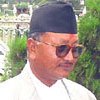 With a single statement, Gopal Man Shrestha has done much more to enhance the stature of Girija Prasad Koirala that the astute octogenarian's entire party could in the 11 months since Nepal became an executive monarchy.
With a single statement, Gopal Man Shrestha has done much more to enhance the stature of Girija Prasad Koirala that the astute octogenarian's entire party could in the 11 months since Nepal became an executive monarchy.When the five-time premier stated in his hometown that he would be open to talks with King Gyanendra if the government put off the local polls, Koirala opened the way to a feverish cycle of speculation, insinuation and calculation.
But the acting president of the Nepali Congress (Democratic) stepped in with his own script.
Shrestha, just back from New Delhi where he was believed to have held consultations with Maoist leaders, sounded like an avid convert to republicanism in advance of his party's crucial convention next month.
The Nepali Congress (D) would vote for a republican setup, Shrestha rumbled, unless King Gyanendra corrected his "mistake" – of imprisoning party president Sher Bahadur Deuba and member Prakash Man Singh.
The other six members of the mainstream alliance have proffered more or less the same repentance-republic tradeoff. However, Shrestha's version made the Nepali Congress, Unified Marxist-Leninists and the smaller constituents sound like hugely principled entities.
Now don't get Maila Baje wrong. He really feels for Deuba and Singh. The two men are under detention on allegations of corruption while the royal regime has allowed much more tainted politicians to reinvent themselves as crusaders for democracy.
But why should King Gyanendra – and the rest of the country, for that matter – have to confront such a cheap challenge? Can the fate of two individuals really determine the ideology of a party and become part of the nation's larger agenda?
Part of Shrestha's motive may be organizational. When Deuba broke away from the Nepali Congress and formed his own party, many had expected the move to herald a generational shift in Nepalese politics.
The gerontocracy guiding the Nepali Congress was incapable of seeing how much the world had changed since 2007 Sal. Democracy in the Nineties was held hostage by two politicians in their late 70s bickering like kindergarteners.
Deuba, after all, was Nepal's first premier to have been educated in the West. What he specifically did or learn at the London School of Economics may be unclear. But he did succeed in roping in a band of young and energetic Nepali Congress politicians who either by education or outlook seemed capable of moving beyond a political legacy built in Benaras and Calcutta.
Soon Nepalis realized what Koirala had recognized all along. Deuba's party was united by nothing more than hatred for the Koirala brand name. Girija may have been an autocrat in his party, but he was also a human being with a personal touch.
Khum Bahadur Khadka, that seemingly invincible Dangali who had two dozens MPs in his pocket at any given moment, was the prime mover of the Congress split. When Khadka found himself in the gaol after Deuba's first dismissal, it was only Girija who telephoned him with words of encouragement.
Once set free, Khadka dumped Deuba to return to Koirala, although we don't know precisely what came out of it for him politically. Personally, for Khadka, it must have been a fitting way of hitting back at Deuba.
In reversing his stand that he would not hold talks with King Gyanendra unless he restored the Feb. 1 status quo ante, Koirala was being pragmatic -- and not because he was paying close attention to Dr. Tulsi Giri's latest remarks.
Koirala knew that the rest of the country would perceive him as having made a pointless climbdown in exchange for a postponement of a ballot he was already boycotting.
But he wasn't that myopic not to have recognized the political space created by the kingdom's two dominant communist factions cozying up – and, of course, the fact that Gopal Man Shrestha was the last prominent leader to visit New Delhi.